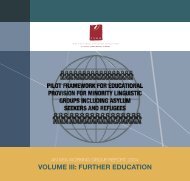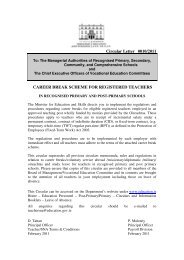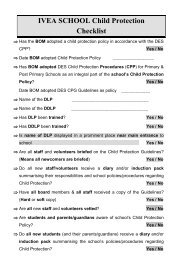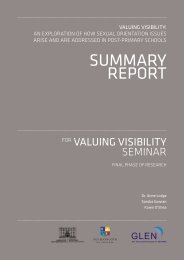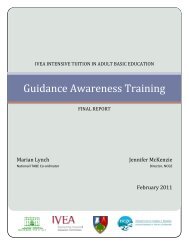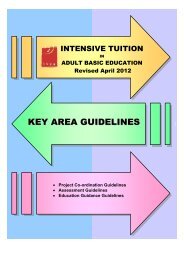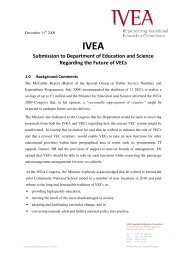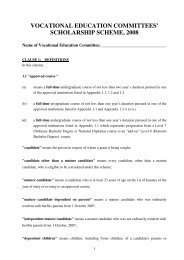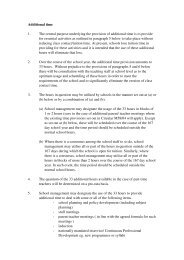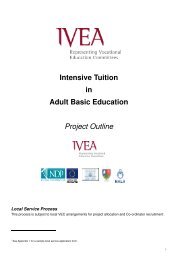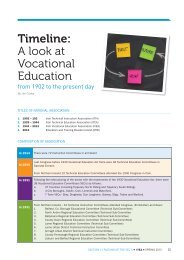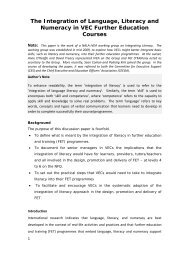Download File - IVEA
Download File - IVEA
Download File - IVEA
You also want an ePaper? Increase the reach of your titles
YUMPU automatically turns print PDFs into web optimized ePapers that Google loves.
from different cultures where different educational attitudes and<br />
practices prevail.<br />
• Schools and teachers should recognise that all students bring their<br />
own strengths to learning derived from their cultural identity and<br />
previous learning and life experiences.<br />
• Schools need to be open to and creative in utilising these<br />
experiences to the students’ benefit.<br />
• <strong>IVEA</strong> recommends that each school provides parents/guardians<br />
with a comprehensive overview of how the school operates, its<br />
policy and ethos, the curriculum etc. In case of conflicting<br />
values, it is recommended that schools engage in dialogue to<br />
reach agreement.<br />
• For communication to be effective, it may be necessary to provide<br />
a translator.<br />
Promoting Student Involvement [S. 5.5]:<br />
<strong>IVEA</strong> recommends that the following recommendations arising from the<br />
CDU report A Whole School Approach to Interculturalism and Inclusion<br />
be implemented:<br />
• Ways should be explored to give students greater voice in school<br />
decision-making, including ongoing review of Student Council<br />
structures by schools to assess their impact and to allow for more<br />
involvement of younger students and those of minority background.<br />
• Appropriate induction and monitoring for all students’ social and<br />
academic welfare should take place.<br />
• Mentoring programmes should be considered, with the possible<br />
development of peer-mentoring. This needs careful planning, training<br />
and ongoing guidance and evaluation<br />
• Work that builds self-esteem, values diversity, supports<br />
understanding of interculturalism and anti-racism should be carried<br />
out with students, both as distinct programmes embedded in<br />
the different subject areas and approached periodically through<br />
cross-curricular theme and project work.<br />
• Consideration should be given to how students who have<br />
experienced and are still affected by trauma can be supported<br />
through pastoral care, counselling and monitoring by the<br />
psychological, health and social welfare services, in tandem with<br />
the school.<br />
• All sectors dealing with student needs will benefit from training in antiracism<br />
and interculturalism.<br />
Promoting Parental Involvement [S. 5.6]:<br />
The CDU report A Whole School Approach to Interculturalism and<br />
Inclusion makes the following recommendations in the context of<br />
supporting and empowering parents:<br />
• Different ways of involving parents in the development of the school<br />
and in the celebration of school activities should be explored.<br />
• Schools should be pro-active in their support of parents from minority<br />
backgrounds and engage in active dialogue with representatives<br />
of minority groups in order to increase awareness of issues of<br />
common interest.<br />
• There is a need for effective structures to facilitate communication<br />
with parents from minority communities. Financial resources should<br />
be provided for translation of key information pertaining to schoollife<br />
and for the services of interpreters (where it is deemed necessary)<br />
as supports to students and parents with limited English.<br />
Support Staff/Bilingual Assistants/Book-loans [S. 5.7]:<br />
• While <strong>IVEA</strong> agrees that extra support staff in the classroom is<br />
necessary, these should be specifically trained language support<br />
teachers. There may also be a need for bilingual assistants. <strong>IVEA</strong><br />
recommends that schools work in co-operation with minority<br />
linguistic communities in this regard.<br />
• <strong>IVEA</strong> recognises that issues relating to social welfare etc may result<br />
in additional workloads. Appropriate training and resources should be<br />
provided to meet this need (refer to section: 5.8).<br />
• While the book-loan fund may not be universally applicable, the<br />
inflexible nature of capitation funding is problematic in this context.<br />
<strong>IVEA</strong> recommends that the Department of Education and Science<br />
introduces a more flexible capitation model, e.g. one/two extra<br />
capitation dates per school year.<br />
Professional Development Training [S. 5.8]:<br />
There is a great need for professional development training in a variety of<br />
areas including:<br />
• Anti-racist and cultural awareness training for all staff in the school;<br />
• Language Aware Teaching Methodologies;<br />
• Information sessions on social/legal situation of bilingual/EAL learners<br />
and their families for designated staff members;<br />
• Training for designated person in educational provision for second<br />
language learning [this item is dealt with in chapter 6].<br />
Anti-racist/Cultural Awareness Training [S. 5.8]:<br />
• Inservice is needed for all staff in respect of anti-racism and<br />
interculturalism. Anti-racist training is essential if equality in the<br />
classroom is to be achieved.<br />
Language Aware Teaching Methodologies [S. 5.8]:<br />
• There is a need for appropriate training for all teachers of<br />
second language learners. Training in language aware teaching<br />
methodologies should be an integral part of pre-service and<br />
in-service training.<br />
• <strong>IVEA</strong> recommends that Higher Diploma in Education courses<br />
incorporate language aware teaching methodologies for all studentteachers<br />
and make training in EAL methodologies available.<br />
• <strong>IVEA</strong> recommends that inservice training in all areas of the curriculum<br />
incorporate language aware teaching methodologies.<br />
• Regular inservice training, opportunities to observe good practice,<br />
collaboration, consultation and team teaching are all essential.<br />
• Professional development relies upon regular discussion and sharing<br />
of good practice. At institutional level its effectiveness will depend upon<br />
much more than individual initiatives in isolated classrooms. It requires<br />
40



